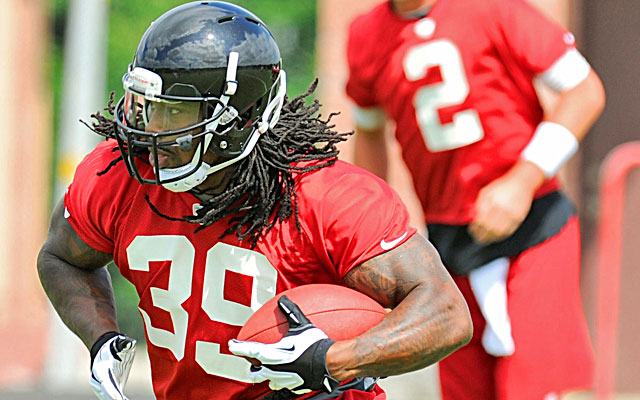- Joined
- Jun 28, 2010
- Messages
- 49,214
- Name
- Burger man

<a class="postlink" href="http://www.usatoday.com/story/sports/nfl/columnist/2013/06/11/steven-jackson-atlanta-falcons-jarrett-bell-curtis-martin/2413547/" onclick="window.open(this.href);return false;">http://www.usatoday.com/story/sports/nf ... n/2413547/</a>

FLOWERY BRANCH, Ga. — Two days before he is due to report to his first training camp with the Atlanta Falcons next month, Steven Jackson will celebrate a milestone.
He will turn 30, and you know what that means ... uh-oh.
Conventional wisdom, NFL style, suggests Jackson will become a walking fossil after his 30th birthday because he is a running back — and at that age, men who make a living pounding the rock are merely running on borrowed time in a younger man's game.
Running backs already have the shortest career span of any NFL position, a little more than two years. So if they're still around by 30, their explosiveness — and after all of those hits — often has the yield of wet dynamite. The legs are often gone.
Ask Shaun Alexander. Or Earl Campbell, Eddie George or Edgerrin James.
There's a long list of runners who tore it up early in their careers, then fizzled fast.
It's logical. There are only so many miles and so much pain to be endured.
Jackson has heard all of this before. He scoffs.
"That's laughable to me," he said Tuesday following an OTA session. "This is not the '70s or the '80s, when it was just hard-nosed football. The game has changed. As long as I can evolve with it, I'll be just fine."
Jackson, whose evolution includes a gluten-free diet for the first time, has a fresh start after all of those years with the St. Louis Rams when he was the best player on some of the worst teams in football. The Rams are on rise now, but in Jackson's nine seasons with the team, he only reached the playoffs once ... and that was his 2004 rookie season.
Can't blame him for hitching up with a Falcons team that advanced to (and collapsed in) the NFC Championship Game last season but is poised to make another run.
But he's bringing with him a 6-2, 240-pound body that has logged 2,395 NFL carries.
"I get it," he says, with an edge that would be rather dangerous if met head-on in the open field. "Everyone's a GM and everyone's a coach at home."
Jackson pulls out an example that changes the course of the discussion. He could have mentioned Walter Payton, John Riggins or Emmitt Smith. Instead he went with a recently minted Hall of Famer: Curtis Martin.
"He performed pretty well in his 30s," Jackson said.
Martin was 31 when he won an NFL rushing crown with the New York Jets in 2004, with 1,697 yards.
"Certain people in certain generations do well," Jackson added. "Why not me?"
The Falcons are buying it.
As coach Mike Smith put it, "He's almost 30, but in a 22-year-old's body."
Smith saw his rushing attack average a scant 3.7 yards per rush last season with since-discarded Michael Turner as the featured ball-carrier.
When Turner arrived in 2008, he lessened the pressure as then-rookie quarterback Matt Ryan developed. Turner carried an NFL-high 376 times that year, while Ryan threw 434 passes. Last season, in an offense that has evolved with a bevy of playmakers, Ryan had a career-high 615 pass attempts while Turner rushed 222 times.
That's why I think this was one of the most crucial moves of the offseason.
Sure, the Falcons still have issues to address on defense — most notably with a pass-rush that is light on proven performers — but adding Jackson to a key complementary role at 30 is a lot different than asking him to tote the football 25 times per game. Add the NFL's continual evolution into a pass-happy league, less contact in practice and the year-round training that exists in the NFL and, well, 30 might be the new 28 for NFL running backs.
Besides, Jackson doesn't want to be all pound and ground. Despite the short dump-off over the middle Tuesday that slipped through his fingers and into linebacker Akeem Dent's hands for an interception, he is itching to show that he's been under-utilized as a receiving target.
"That's a part of my game that a lot of people don't acknowledge or aren't aware of," he said. "Early in my career, I was catching the ball out of the backfield like crazy."
Still, the Falcons need to be able to run it consistently when they want to. That factor can bail out a defense and might have helped put away the Seattle Seahawks in the NFC divisional playoff game that nearly got away and the title game against the San Francisco 49ers that indeed slipped from Atlanta's grasp.
"I feel a different type of pressure," says Jackson, who has rushed for eight consecutive 1,000-yard seasons and 10,135 career yards. "Me getting this team back to the playoffs, that's not special. They've done that. I need to be the piece that gets you over the hump."
Maybe the hints that he's close to the finish line will add fuel.
But not in the conventional sense to silence the doubters. The cause is more noble than that.
"I'm not taking this as something to prove critics wrong," he said. "I'm doing it to give another generation of backs an opportunity to play longer than 30. They try to push you out of the league just because of the history."
That's the ticket. Jackson can be a game-changer in more ways than one.


FLOWERY BRANCH, Ga. — Two days before he is due to report to his first training camp with the Atlanta Falcons next month, Steven Jackson will celebrate a milestone.
He will turn 30, and you know what that means ... uh-oh.
Conventional wisdom, NFL style, suggests Jackson will become a walking fossil after his 30th birthday because he is a running back — and at that age, men who make a living pounding the rock are merely running on borrowed time in a younger man's game.
Running backs already have the shortest career span of any NFL position, a little more than two years. So if they're still around by 30, their explosiveness — and after all of those hits — often has the yield of wet dynamite. The legs are often gone.
Ask Shaun Alexander. Or Earl Campbell, Eddie George or Edgerrin James.
There's a long list of runners who tore it up early in their careers, then fizzled fast.
It's logical. There are only so many miles and so much pain to be endured.
Jackson has heard all of this before. He scoffs.
"That's laughable to me," he said Tuesday following an OTA session. "This is not the '70s or the '80s, when it was just hard-nosed football. The game has changed. As long as I can evolve with it, I'll be just fine."
Jackson, whose evolution includes a gluten-free diet for the first time, has a fresh start after all of those years with the St. Louis Rams when he was the best player on some of the worst teams in football. The Rams are on rise now, but in Jackson's nine seasons with the team, he only reached the playoffs once ... and that was his 2004 rookie season.
Can't blame him for hitching up with a Falcons team that advanced to (and collapsed in) the NFC Championship Game last season but is poised to make another run.
But he's bringing with him a 6-2, 240-pound body that has logged 2,395 NFL carries.
"I get it," he says, with an edge that would be rather dangerous if met head-on in the open field. "Everyone's a GM and everyone's a coach at home."
Jackson pulls out an example that changes the course of the discussion. He could have mentioned Walter Payton, John Riggins or Emmitt Smith. Instead he went with a recently minted Hall of Famer: Curtis Martin.
"He performed pretty well in his 30s," Jackson said.
Martin was 31 when he won an NFL rushing crown with the New York Jets in 2004, with 1,697 yards.
"Certain people in certain generations do well," Jackson added. "Why not me?"
The Falcons are buying it.
As coach Mike Smith put it, "He's almost 30, but in a 22-year-old's body."
Smith saw his rushing attack average a scant 3.7 yards per rush last season with since-discarded Michael Turner as the featured ball-carrier.
When Turner arrived in 2008, he lessened the pressure as then-rookie quarterback Matt Ryan developed. Turner carried an NFL-high 376 times that year, while Ryan threw 434 passes. Last season, in an offense that has evolved with a bevy of playmakers, Ryan had a career-high 615 pass attempts while Turner rushed 222 times.
That's why I think this was one of the most crucial moves of the offseason.
Sure, the Falcons still have issues to address on defense — most notably with a pass-rush that is light on proven performers — but adding Jackson to a key complementary role at 30 is a lot different than asking him to tote the football 25 times per game. Add the NFL's continual evolution into a pass-happy league, less contact in practice and the year-round training that exists in the NFL and, well, 30 might be the new 28 for NFL running backs.
Besides, Jackson doesn't want to be all pound and ground. Despite the short dump-off over the middle Tuesday that slipped through his fingers and into linebacker Akeem Dent's hands for an interception, he is itching to show that he's been under-utilized as a receiving target.
"That's a part of my game that a lot of people don't acknowledge or aren't aware of," he said. "Early in my career, I was catching the ball out of the backfield like crazy."
Still, the Falcons need to be able to run it consistently when they want to. That factor can bail out a defense and might have helped put away the Seattle Seahawks in the NFC divisional playoff game that nearly got away and the title game against the San Francisco 49ers that indeed slipped from Atlanta's grasp.
"I feel a different type of pressure," says Jackson, who has rushed for eight consecutive 1,000-yard seasons and 10,135 career yards. "Me getting this team back to the playoffs, that's not special. They've done that. I need to be the piece that gets you over the hump."
Maybe the hints that he's close to the finish line will add fuel.
But not in the conventional sense to silence the doubters. The cause is more noble than that.
"I'm not taking this as something to prove critics wrong," he said. "I'm doing it to give another generation of backs an opportunity to play longer than 30. They try to push you out of the league just because of the history."
That's the ticket. Jackson can be a game-changer in more ways than one.


